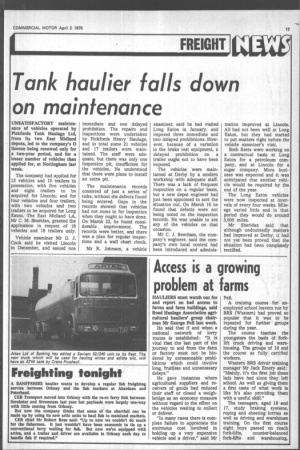Tank haulier falls down on maintenance
Page 19

If you've noticed an error in this article please click here to report it so we can fix it.
UNSATISFACTORY maintenance of vehicles operated by Pickfords Tank Haulage Ltd, from its two East Midland depots, led to the company's 0 licence being renewed only for a two-year period, and for a lesser number of vehicles than applied for, at Nottingham last week.
The company had applied for 13 vehicles and 10 trailers in possession, with five vehicles and eight trailers to be acquired for Lincoln; and for four vehicles and four trailers, with two vehicles and two trailers to be acquired for Long Eaton. The East Midland LA, Mr C. M. Sheridan, granted the application in respect of 18 vehicles and 18 trailers only.
Vehicle examiner Mr D. J. Cook said he visited Lincoln in December, and issued one immediate and one delayed prohibition. The repairs and inspections were undertaken by Pickfords Heavy Haulage, and in total some 21 vehicles and 17 trailers were maintained. The staff were adequate, but there was only one inspection pit, insufficient for the vehicles. He understood that there were plans to install an extra pit.
The maintenance records consisted of just a series of ticks, without the defects found being entered. Gaps in the records showed that vehicles had not come in for inspection when they ought to have done. On March 22, he found considerable improvement. The records were better, and there was a plan for regular inspections and a wall chart check.
Mr R. Johnson, a vehicle examiner, said he had visited Long Eaton in January, and imposed three immediate and two delayed prohibitions. However, because of a variation in the brake test equipment, a delayed prohibition on a trailer ought not to have been imposed.
The vehicles were maintained at Derby by a modern workshop with adequate staff. There was a lack of frequent inspection on a regular basis, but a new depot engineer had just been appointed to sort the situation out. On March 16 he found that defects were not being noted on the inspection records. He was unable to see any of the vehicles on that occasion.
Mr C. J. Beecham, the company's engineer, said the company's own local control had been introduced and adminis tration improved at Lincoln. All had not been well at Long Eaton, but they had started to put matters right before the vehicle examiner's visit.
Both fleets were working on a contractual basis at Long Eaton for a petroleum company, and at Lincoln for a sugar company. More business was expected and it was anticipated that another vehicle would be required by the end of the year.
The Long Eaton vehicles were now inspected at intervals of every four weeks. Mileage varied little and in that period they would do around 3,000 miles.
Mr Sheridan said that although undoubtedly matters had improved at Derby, it had not yet been proved that the situation had been completely rectified.




























































































